Read updates on the fifth round of negotiations for Plastics Treaty ➝
Protect our planet! Last chance to join the call for a strong Plastics Treaty. SIGN THE PETITION NOW.
Tuesday | November 26, 2024
Peru deserves recognition today for leading alongside Rwanda with a proposal to reduce the global use of primary plastics polymers (PPP) that aligns with circular economy objectives and environmental protection efforts and highlights the importance of collective action as well as the need to adjust strategies to combat plastic pollution effectively. The proposal follows the lead of the Paris Agreement and the Kunming-Montreal Global Biodiversity Framework and targets a 40% reduction in PPP usage by 2040 from 2025 levels. It also seeks to establish a flexible plan within the global plastic treaty that includes regular reviews to monitor progress.
During the plenary, we heard a diverse group of voices from the observers' tables calling on the need for ambitious priorities to be part of the treaty text. The Alliance of Waste Pickers called for stronger recognition of waste pickers' rights and health. The UN Special Rapporteur on Toxics and Human Rights highlighted the little attention that has been paid to human rights during the sessions. Additionally, 16-year-old Aeshnina (Nina) Azzahra Aqilani, representing River Warrior Indonesia and Break Free From Plastic Youth, exposed the devastating impact of plastic and illegal plastic waste trade on her community's health and environment.
The Society of Native Nations’ call for a treaty that addresses the full life cycle of plastics received a standing ovation.
Saturday | November 30, 2024
Available in other translations:
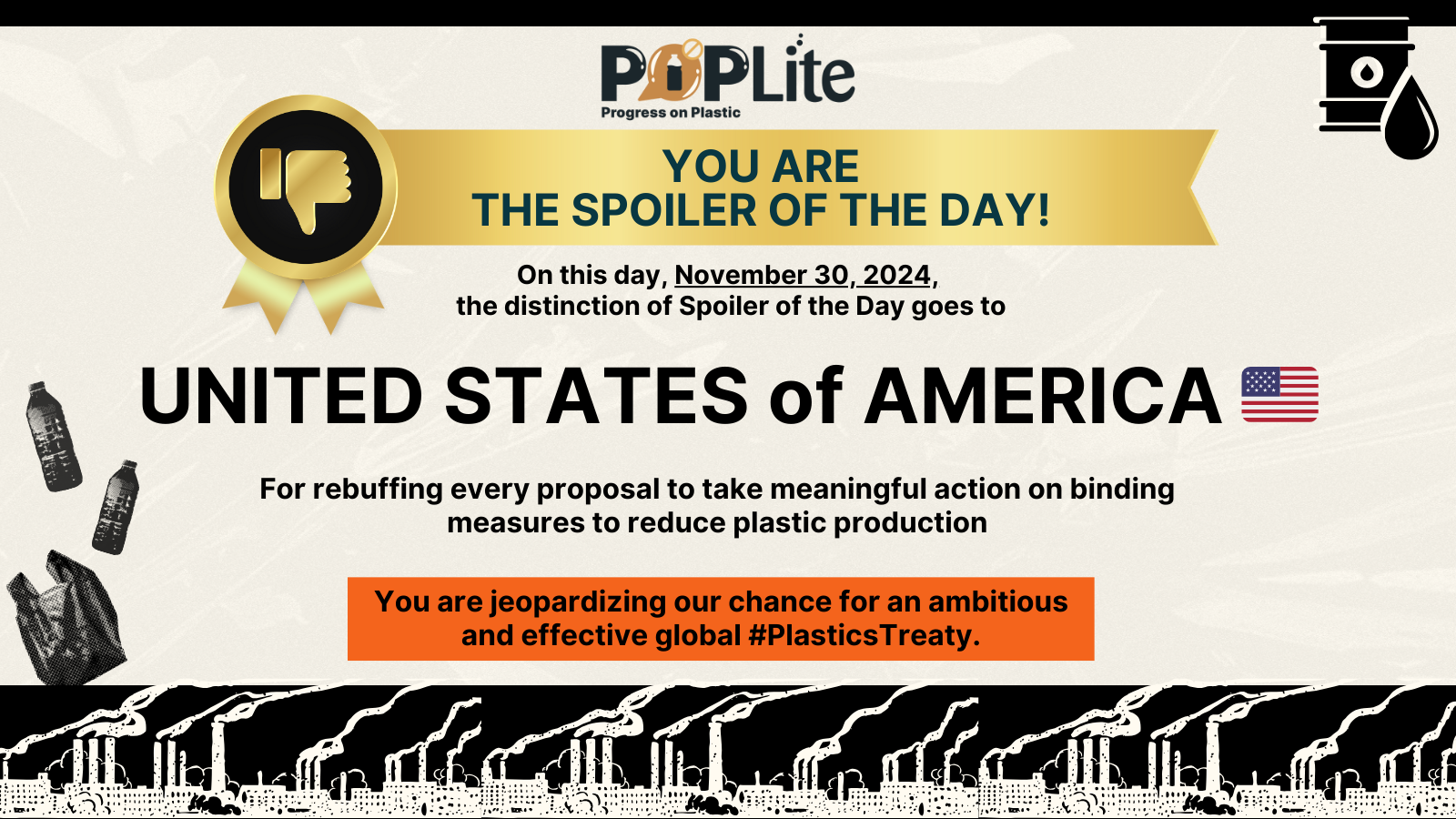
Today, the distinction of Spoiler of the Day goes to UNITED STATES of AMERICA.
Despite not being a Party to a majority of multilateral environmental agreements and with Donald Trump's promise to once again pull out of the Paris Agreement, the US claims it is negotiating an ambitious Treaty. This has translated into the US trying to insert language in the text that looks good on the surface but is non-binding and gives countries the "flexibility" to continue as usual.
The US claims to be ambitious but has not stepped up as much as it said it would. It has so far rebuffed every proposal to take meaningful action by members of the High Ambition Coalition, including one made by Panama on binding measures to reduce plastic production.
We hope they deliver on their promises and begin to show ambition. We want to call the US a champion before we leave Busan.
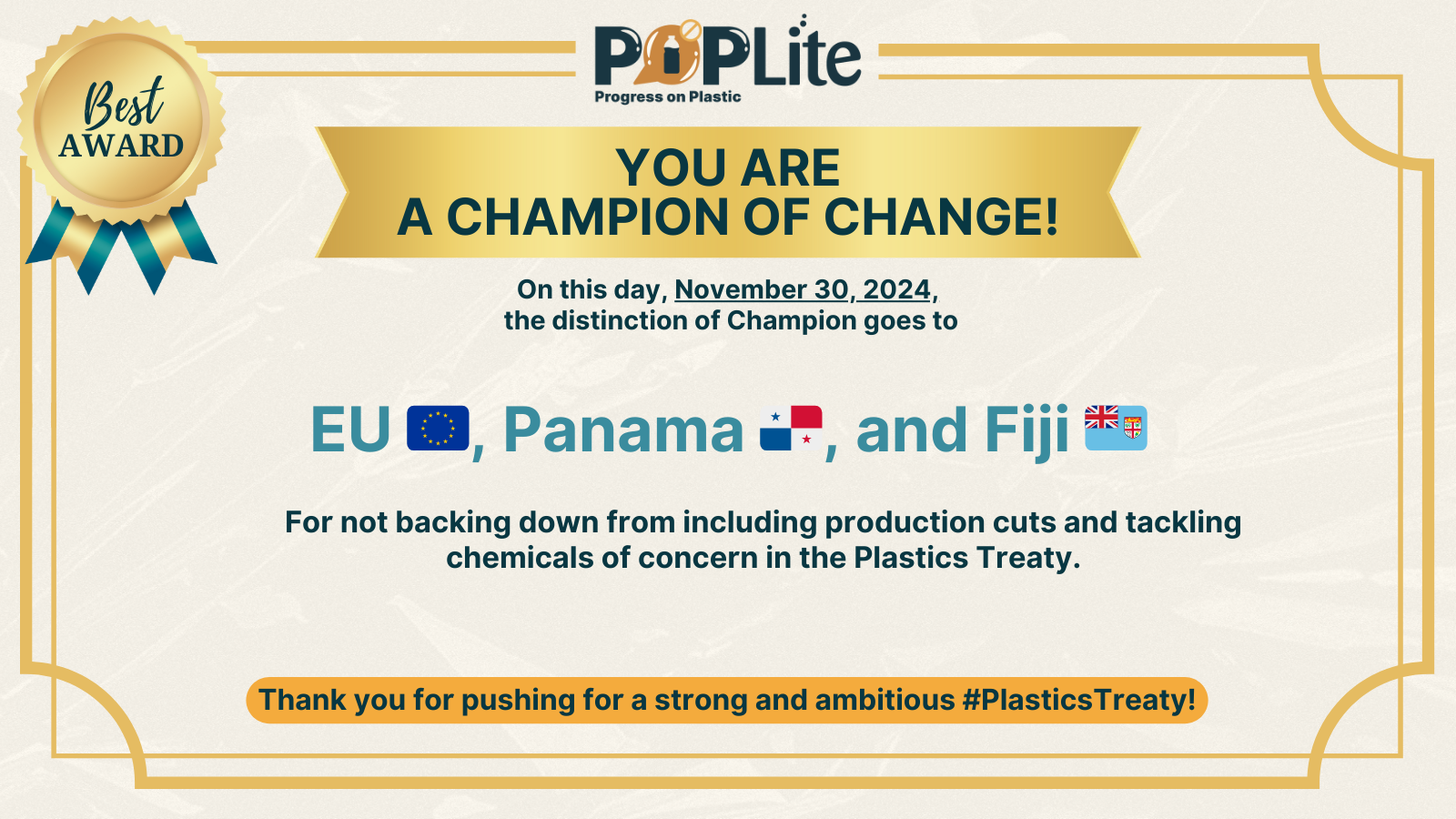
On the other side of the spectrum, today’s Champion is the EU, Panama, and Fiji
Let’s give a round of applause to our Champions of the day: the EU, Panama, and Fiji. They’re leading the charge for a strong and ambitious plastics treaty by not backing down from including production cuts and tackling chemicals of concern in the agreement.
Panama even called out the low-ambition crowd to step aside if they’re not ready to stand up and work out a deal that addresses the root causes of this crisis.
This is what courage looks like, folks! We’re cheering for other member states to join the party and for the Chair to finally step up and steer us away from a downward spiral of low expectations.
In a daring protest against the fossil fuel and petrochemical industries, Greenpeace activists boldly boarded a tanker at South Korea's Hanwha TotalEnergies complex, where toxic plastic chemicals were prepared for loading.
At this critical juncture of the negotiations, the guerilla action urges governments worldwide to resist industry interference and push for a comprehensive treaty that would significantly reduce plastic production and address chemicals of concern.
The International Indigenous Peoples Forum on Plastics held a powerful press conference where Indigenous Peoples, waste pickers and frontline and fenceline leaders shared solutions, as well as their demands and frustrations with the treaty process.
It’s imperative for the Global Plastics Treaty to be rooted in Indigenous rights, which have been continuously violated over centuries. Indigenous people are not victims but rights holders who maintain an intimate relationship with the land and hold solutions for the best path forward.
Friday | November 29, 2024
Available in other translations:
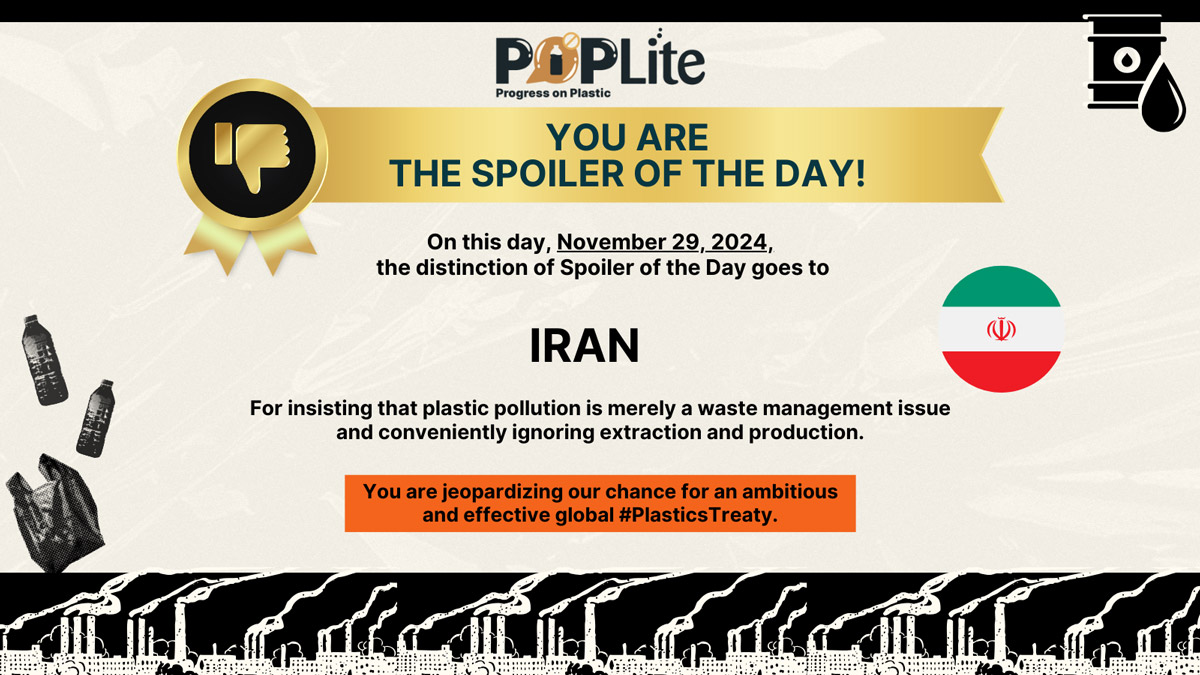
The cat’s not just out of the bag — it’s doing a full-on tap dance. From the start of this process, Iran has been questioning the scope of the plastics treaty, adamantly insisting that plastic pollution is merely a waste management issue and conveniently ignoring extraction and production—key stages in the full life cycle of plastic. This is not totally unexpected.
Iran has officially proposed that feedstocks like hydrocarbons and their derivatives (or, as we like to call them, fossil fuels and petrochemicals) and primary plastic polymers should be left out of the treaty! Quite the audacious proposal from a country that’s one of the top greenhouse gas emitters.
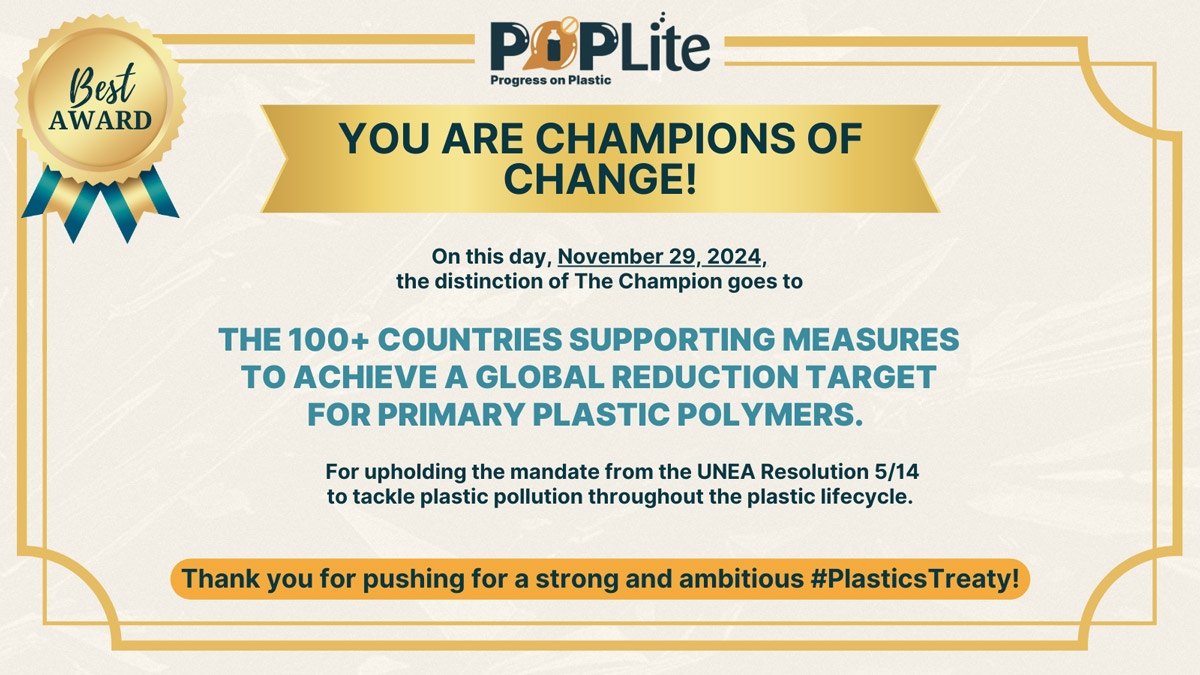
Today’s Champions are the 100+ countries supporting measures to achieve a global reduction target for primary plastic polymers.
Over 100 countries are supporting mandatory measures to achieve a global reduction target for primary plastic polymers, upholding the mandate from the UNEA Resolution 5/14 to tackle plastic pollution throughout the plastic lifecycle.
We commend these countries for recognizing, at this critical moment in the negotiations, how imperative it is to reduce plastic production globally in order to resolve the plastic pollution crisis.
May they find the will and the courage to see through their proposal to its rightful and logical conclusion.
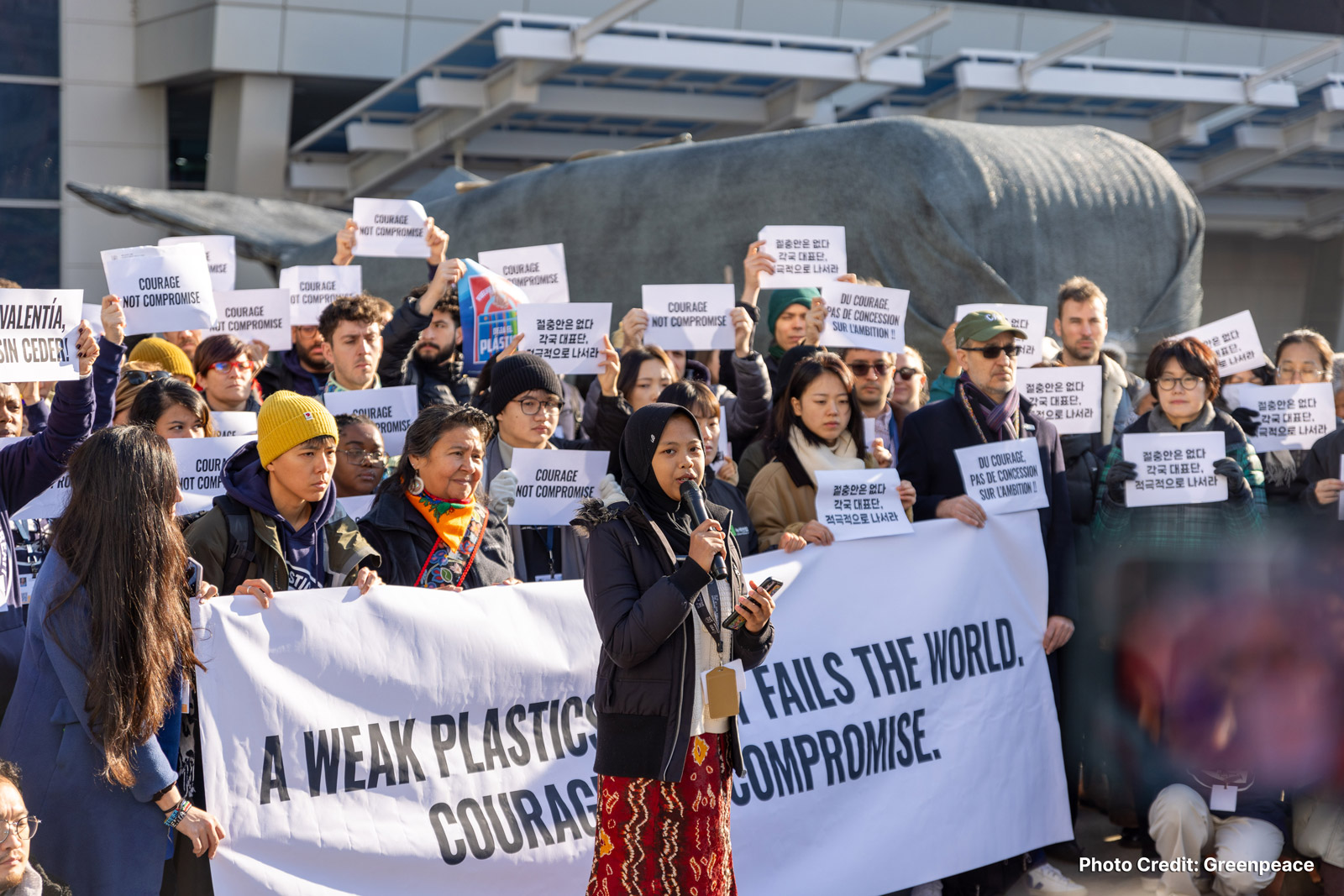
On the sidelines of INC-5 negotiations, conversations on reuse and refill continue as advocates hope to see treaty provisions that will create an enabling environment for reuse systems worldwide. At the reuse and refill solutions event, panelists discussed the need to define reuse transition targets, global regulations, and accessible and inclusive standards.
Reuse and refill solutions from Africa, Europe, Latin America, Asia, and the U.S. were showcased and speakers demonstrated the benefits of incentivizing reuse.
In another event, health scientists explained how plastics invade the human body and endanger health. In the screening of the mini-documentary Plastic & Brains, specialists discussed microplastics entering human brains through the nose and chemicals leaching into food from plastic packaging.
Today, the Basel Action Network (BAN), the Break Free from Plastic movement (BFFP), and the ECOTON Foundation held a panel discussion emphasizing that the global plastic waste trade is a symptom of plastic overproduction.
They discussed the drivers of waste trade, how the myth of plastic circularity perpetuates partial and inefficient recycling in less industrialized economies, and the impact of waste colonialism on local communities, especially on children and youth.
The key takeaway was that the Plastics Treaty must focus on reducing plastic production as the best and only viable way to reduce plastic waste, waste trade, and the pollution that results from it.
Thursday | November 28, 2024
Available in other translations:
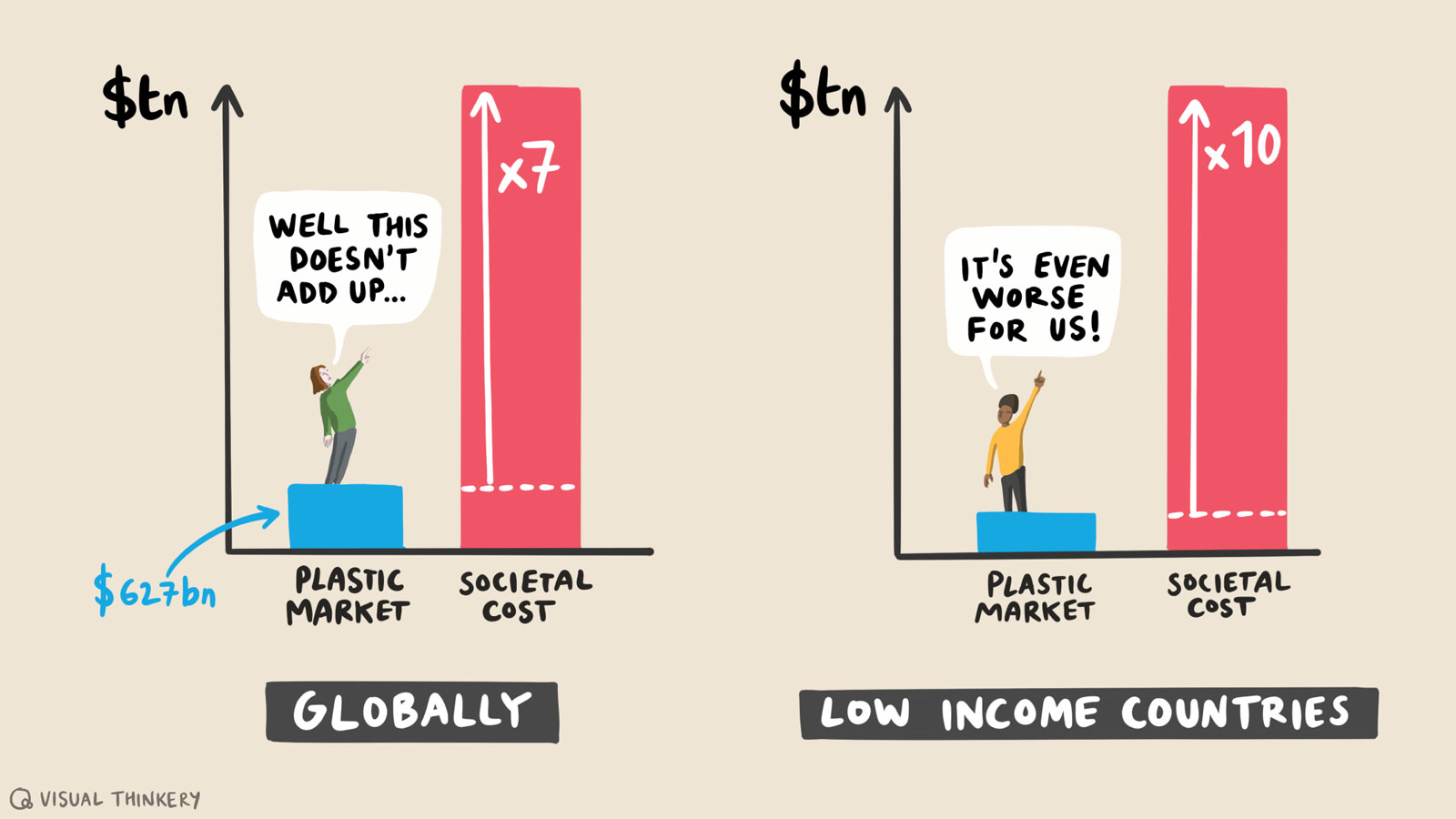
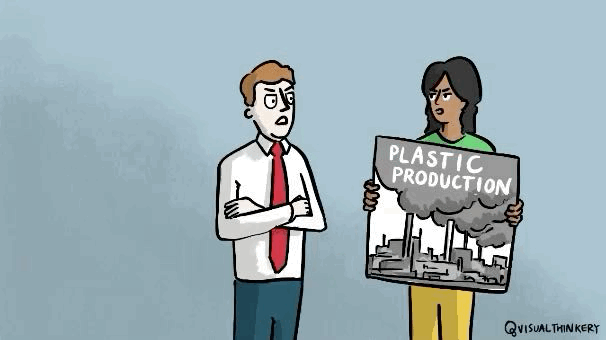
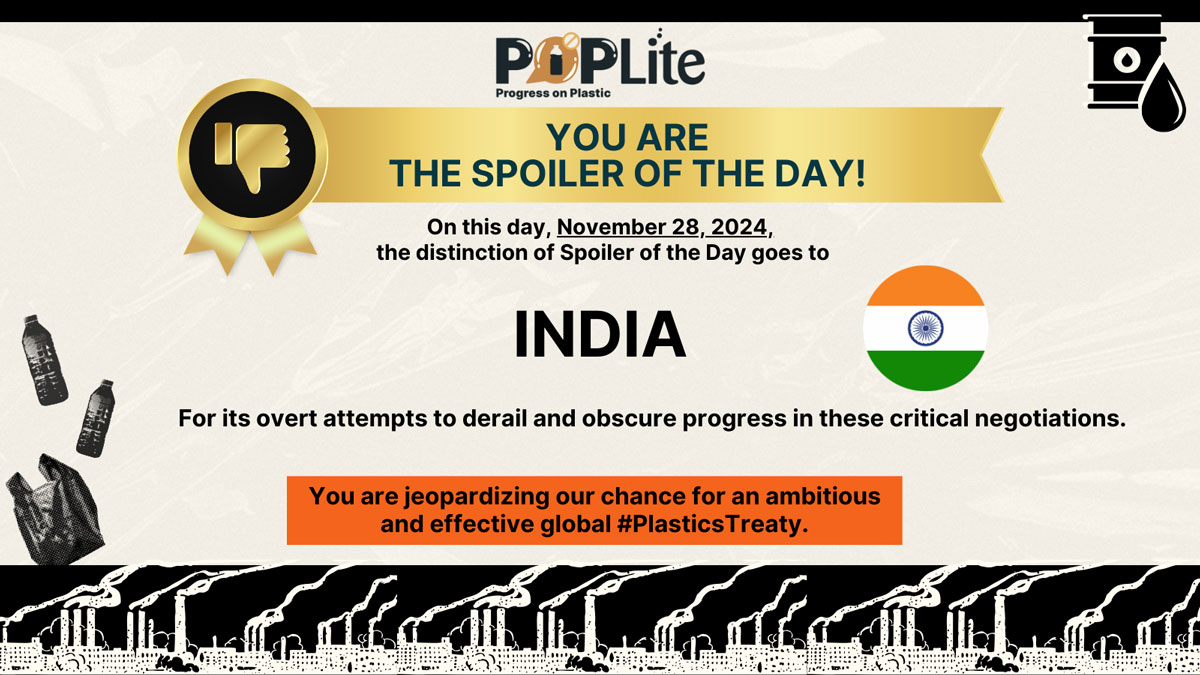
Today, the distinction of Spoiler of the Day goes to INDIA
Throughout these negotiations, India has consistently challenged the scope of the potential treaty, cloaking its intentions in the rhetoric of consensus and inclusivity.
However, it has become increasingly clear that this stance is part of an effort to weaken the treaty’s ambitions, aligning with its expanding petrochemical interests under the guise of development.
One might expect India, given its vocal demands at COP 29 for greater climate funding to assist developing nations, to champion genuine solutions for the Global South and promote their interests in tackling the escalating plastic crisis.
India's overt attempts to derail and obscure progress in these critical negotiations have earned it the title of Spoiler of the Day.

In several events, experts and civil society representatives discussed evidence on the impact of plastic pollution. In a special screening of the Netflix documentary "Buy Now! The Shopping Conspiracy," a panel of experts, including frontline voices, discussed the realities of how single-use packaging, textiles, and other discards pollute the environment and urged everyone to challenge systems and the status quo.
At another event by the Korean group OSEAN, speakers pointed out that cleanup efforts are not enough to solve the plastic crisis and recommended systemic changes, including reuse and refill solutions. It remains to be seen if these conversations successfully influence countries’ positions inside the negotiation rooms.
Wednesday | November 27, 2024
Available in other translations:
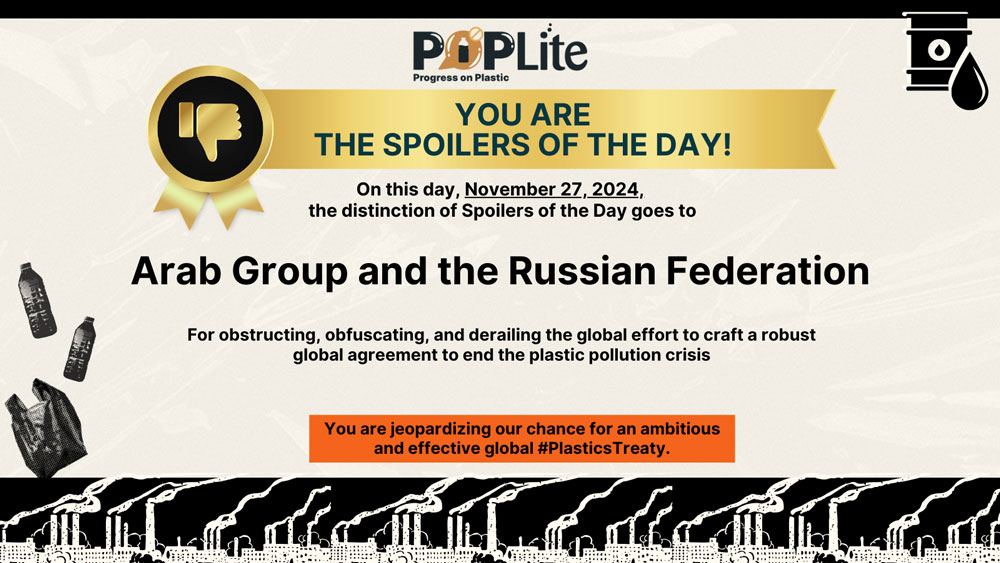
Today, the distinction of Spoilers of the Day goes to the Arab Group and the Russian Federation.
In today’s Plenary, the tag-teaming members of the Arab Group, along with the Russian Federation, feigned concern over the limited progress made after three days of negotiations in contact groups. They conveniently ignored their own role in stalling progress by constantly narrowing the scope of the potential treaty,insisting on bracketing every single proposal and using consensus as a way to block the process, in a systematic and constant way.
Their combined actions have hindered efforts to achieve any kind of headway so far, with just four days to go before a deal is reached in Busan. It appears these parties have come together with the aims of obstructing, obfuscating and derailing the global effort to craft a robust global agreement to end the plastic pollution crisis.
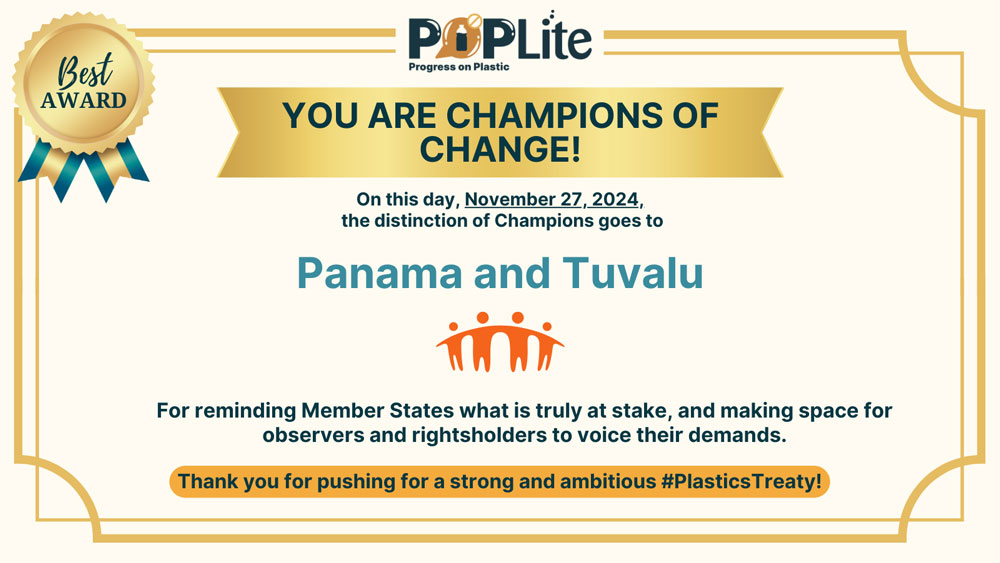
On the other side of the spectrum, today’s Champions of the Day are Panama and Tuvalu.
With less than two days to provide text to the legal drafting group, Panama whipped up the Member States by reminding them of the plastics crisis we are facing and the fact that we are raising a generation that starts their life polluted before they take their first breath while we are debating semantics and procedures. Panama, you are our Champion of the Day for alerting the committee about what is truly at stake.
Our other Champion of the Day is Tuvalu. In the face of heightened restrictions for observers and rightsholders by the Chair, Tuvalu recognized the importance of acknowledging the rights of Indigenous Peoples and yielded its floor for the Indigenous Peoples Caucus to voice their demands for timely delivery of a strong treaty.
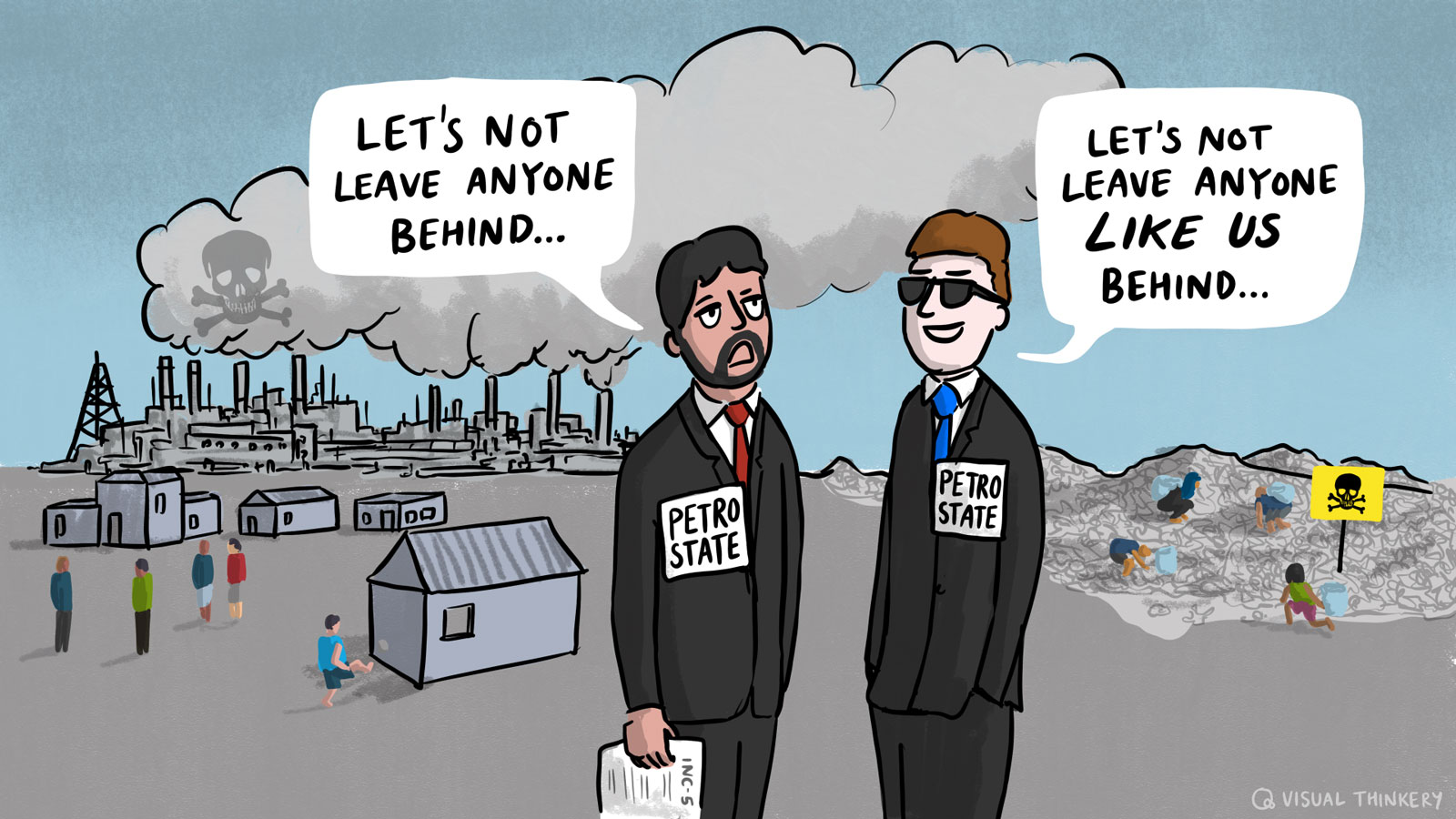
Civil society, businesses, waste pickers, experts, and reuse practitioners in Asia strengthened calls for a strong treaty that promotes reuse solutions to reduce plastic pollution. In a special forum, panelists highlighted the need for common definitions, standards, regulations, and financing to create an enabling environment for reuse solutions to scale and thrive. The Asia Reuse Consortium, BFFP, and GAIA showcased reuse and refill models in the region, including a new report featuring case studies from across Asia.
Earlier today, European groups No Plastic in My Sea and Objectif Zero Plastique called for reducing the production and consumption of plastic bottles specifically by engaging delegates at the entrance of the negotiation venue.
Unfortunately, the host country did not use the INC as an opportunity to showcase reuse solutions, as the food and beverages services provided in the venue are all single-use.
An often-heard phrase at INC-5 – ‘leave no one behind’ – has become hollow rhetoric used by petrochemical states to mask their deliberate marginalization of the most vulnerable communities.
While claiming inclusivity and transparency, these states systematically sideline frontline and fenceline communities, waste pickers, Indigenous Peoples, and other groups whose very livelihoods are under direct threat from petrochemical expansion.
In reality, this rhetoric translates to an appropriation of a political slogan – ‘leave no one like us behind’ – corrupted to serve the interests of powerful stakeholders while rendering the most impacted communities voiceless and invisible in critical negotiations that will fundamentally affect their survival and their future.
Tuesday | November 26, 2024
Available in other translations:
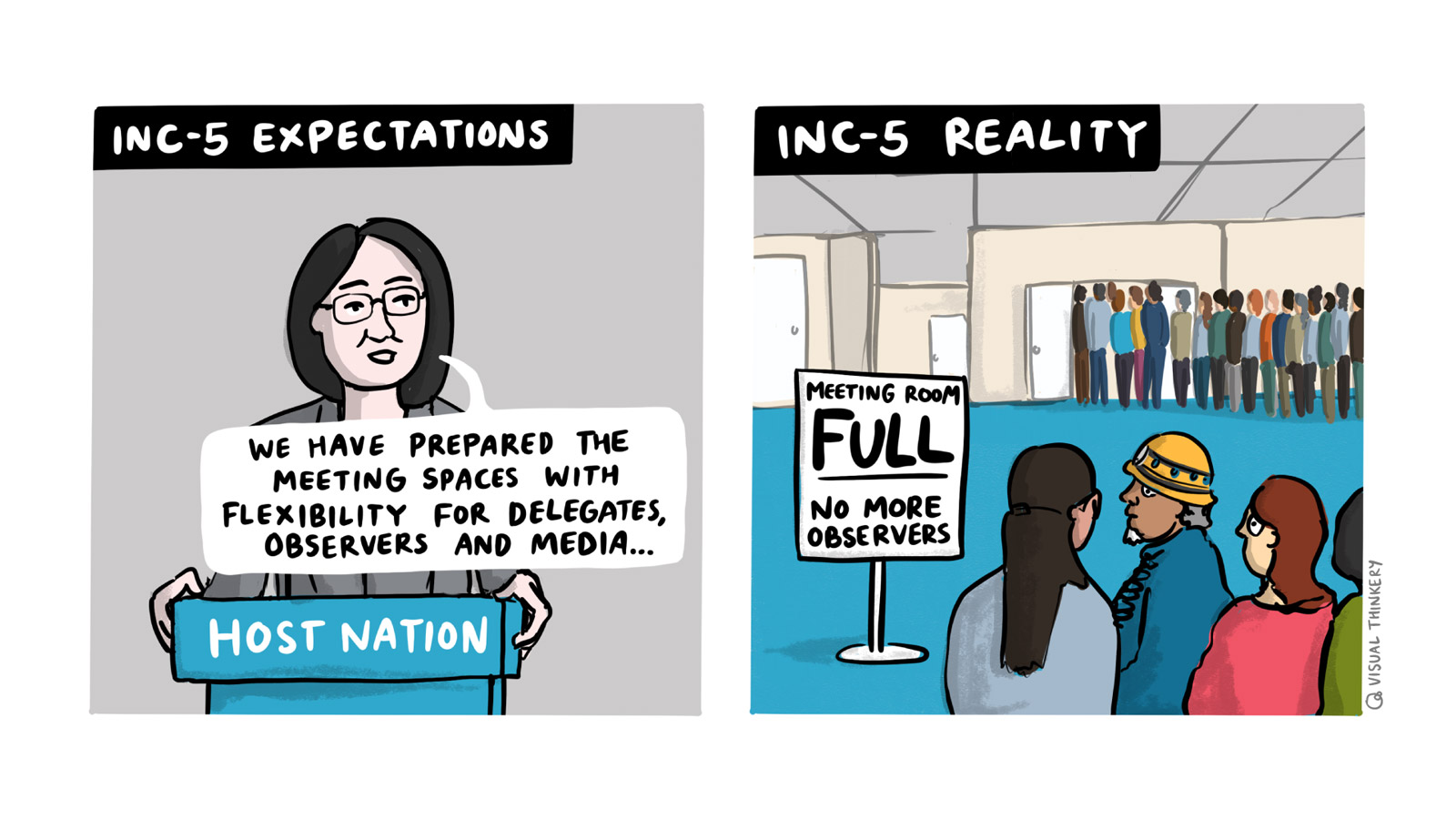
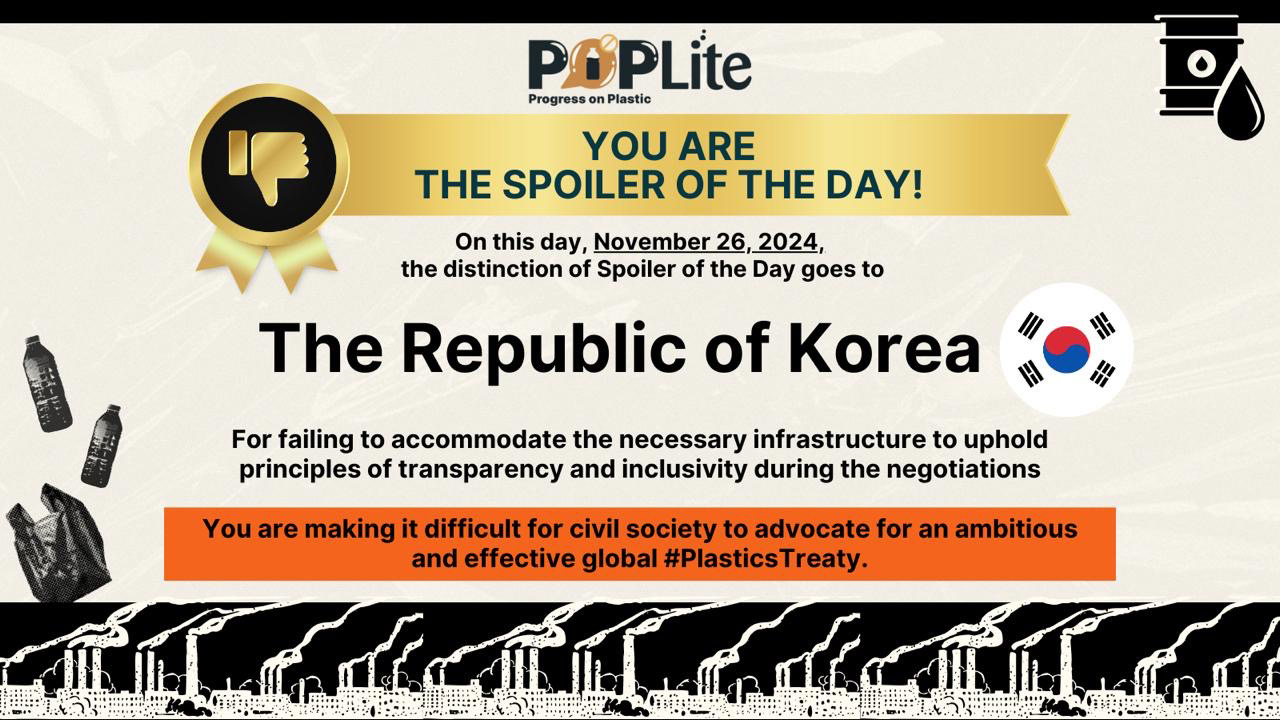
Today, the award of Spoiler of the Day goes to the Republic of Korea
Although the host country of INC-5 has shown ambition by advocating for production reduction measures in the treaty text, its hospitality as the host country for INC-5 has not been welcoming. The Republic of Korea has failed to provide adequate space for meaningful participation in negotiations—both Member States and registered observers are finding themselves constrained to small packed rooms for contact group meetings with poor internet connection and a lack of chairs.
Rooms can accommodate up to 60 observers total (equivalent to only 3% of registered observers), which is something that the host country could have foreseen. This has led to many observers being unable to get into the negotiation rooms, including members of the Indigenous Peoples Caucus. Some Member States even had to stand in the back despite multiple requests from local Korean advocates to rectify the situation.
The Government of the Republic of Korea has failed to accommodate the necessary infrastructure to uphold principles of transparency and inclusivity, and has thereby created a stressful environment unfit for high-stakes negotiations.
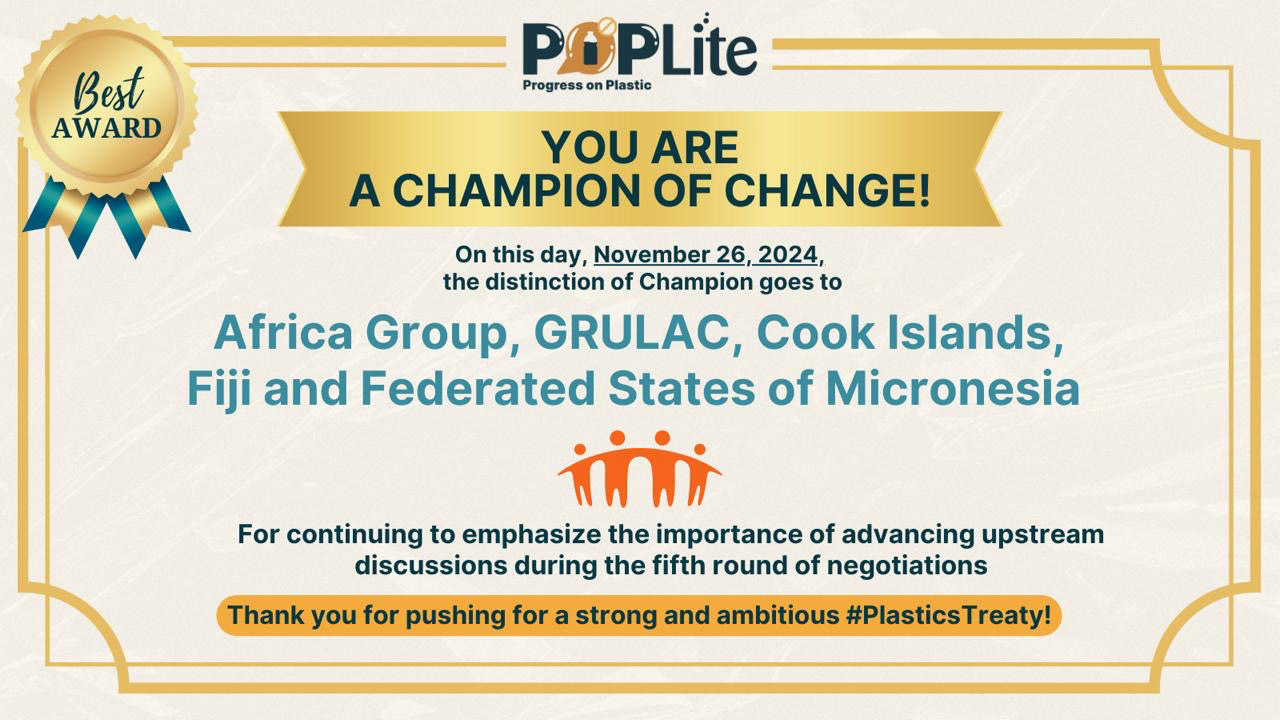
The Champion of the Day are the Africa Group, GRULAC (Group of Latin America and Caribbean), Cook Islands, Fiji and Federated States of Micronesia.
Today’s champions are the proponents of a written submission advocating for the establishment of an independent new, adequate, and accessible financial mechanism to support developing countries to meet their obligations under the proposed treaty.
The proposed funding mechanism, which would be bankrolled by developed countries, would help advance environmental justice and equity, recognizing that the crisis of plastic pollution is rooted first in the historic and excessive production and use of plastics by the industrialized world.
It also acknowledges the need for robust means of implementation to enable binding obligations across the full lifecycle of plastics.
Outside of the negotiation rooms, a diverse group of voices called for upstream measures to be part of the treaty text. During events by Plastic Pollution Coalition and Greenpeace, 350+ Champions of Change businesses were celebrated for signing an open letter calling for a cap on plastic production, a phaseout of single-use plastics, targets for reuse, and justice.
A separate forum featured Indigenous Peoples, waste pickers, frontline communities, and other impacted groups sharing their expertise on how INC-5 is an opportunity to embrace Just Transition guidelines for the treaty.
At another event, mission-based recyclers emphasized that the treaty should be based on the waste hierarchy–Reduce first, Reuse next, and only then Recycle. Lastly, business representatives from Lush (a cosmetics brand) and Vessel (a reuse company) talked about how they are already making low plastic use a reality.
These progressive voices, however, starkly contrasted with the Business Coalition's conspicuous silence on plastic production reduction.
Monday | November 25, 2024
Available in other translations:
Over the past three days, rights-holders' collective voices and actions have been loud and powerful. Starting on Saturday, movement and coalition members blanketed the city with ads, mobilized over 1,500 people to march through the streets of Busan, delivered nearly 3 million petition signatures, and united more than 500 individuals to form a human sign across Haeundae Beach.
Other creative actions included distributing Korean rice cakes, flyers, and local newspapers to engage delegates in the importance of an ambitious treaty that reduces plastic production and protects human health and the environment.
Multiple obstacles at INC-5 hinder observer participation. Observers were not provided an opportunity to speak at the opening plenary, despite many having signed up to speak. The Rethinking Plastic Life exhibit–which allows stakeholders to showcase their perspectives–is a 15-minute walk from where actual negotiations occur.
UNEP also failed to provide a dedicated meeting room for observers and for the Indigenous Peoples’ Caucus. The latter group especially had to incur high expenses to find a place far from the venue. The contact group spaces were very small, with insufficient seating to adequately accommodate delegates and observers, raising concerns by several Member States and resulting in some observers being asked to leave. These logistical arrangements make it difficult for delegates and observers to effectively participate in and respond to the negotiations

Staying true to form with its predilection to employ delaying tactics and dilute the ambition of the treaty, the Kingdom of Saudi Arabia deserves the distinction of SPOILER OF THE DAY!
In the opening plenary, KSA led the charge among the Like-Minded group to push for consensus for decision-making, which, while sounding noble, is a shield to push for the lowest common denominator in these talks.
Additionally, KSA showed resistance to using the Chair’s non-paper as the basis for the negotiations, which was intended to facilitate discussions and streamline negotiations. We expect to see more of the same foot-dragging tactics and stonewalling maneuvers from KSA and its supporting crew of petrostates throughout the week.
Today, we heard topics at the intersection of plastic pollution and women’s issues. In the opening plenary, the delegate from Brazil reminded us that today, 25 November, we commemorate International Day for the Elimination of Violence against Women.
At a meeting with the Women’s Major Group, Dr. Orellana, UN Special Rapporteur on Toxics and Human Rights, highlighted the connection between plastics and women’s and girls' health, as they are disproportionately impacted, calling for a dedicated provision on chemicals of concern and keeping hazardous chemicals out of plastics.